Search
Showing 10 of 1867 results for how to register international groups
-
From the CE: Memorable trip highlights value of international education
This was the first mission led by the Prime Minister since our borders closed in 2020, and it combined education, tourism, New Zealand businesses and government agencies. It sent a clear message that New Zealand is open for business and ready to reconnect with the world.
A couple of excellent things happened in Singapore from an education perspective, the first at Gardens by the Bay, which is a nature park of more than 100 hectares, visited by around 14 million people every year.
At a ceremony to mark the unveiling of a bespoke Māori carving, the Chief Executive of Gardens by the Bay, Felix Loh, spoke about his education experience in New Zealand 30 years ago. He said that studying for a Bachelor of Horticulture at Massey University had a huge impact on his life and career, not only because of what he learnt from his studies, but also because of the care and support he received here. It was a great endorsement of the best that an education in New Zealand can offer and highlighted to everyone who heard him that international education brings long-term value.
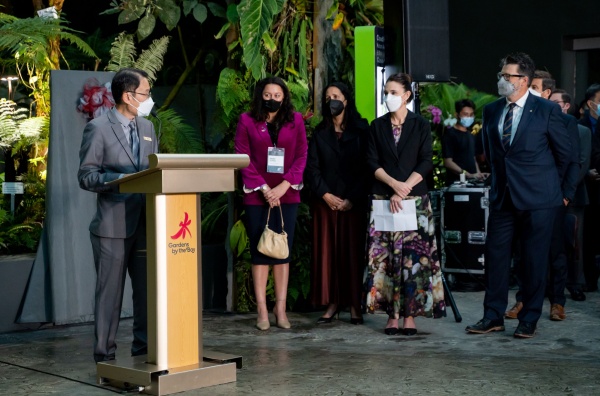
Image: Felix Loh, Chief Executive of Gardens by the Bay, speaks at the ceremony to mark the unveiling of a bespoke Māori carving. Photographer – Karan Gurnani, 35mm.
We had a similar experience the following day, at the signing of an MOU between the Singapore Institute of Technology (SIT) and FoodBowl, a New Zealand food innovation network based in Auckland. The senior signing official for SIT was their President, Professor Chua Kee Chaing, who was a student in New Zealand 40 years ago. Again, we saw the warmth and long-term relationships that are generated by international education.
The Japan part of our trip featured several events with a specific focus on international education, including signing an agreement with Japan Women’s University, relaunching Game on English for female rugby players, and an event at the Cookie Time store in Tokyo with an opportunity to meet previous participants in the working holiday scheme, including former students. You can read more about these events in a separate article in this issue of E-News.
It was great to meet people who feel such a strong connection to New Zealand, even after many years have passed. We often refer to the social, cultural and economic benefits of international education – what we experienced on this trip brought those words to life and marked another significant step on our path to rebuild New Zealand’s international education sector.
He aha te mea nui o tea ao? He tangata, he tangata, he tangata
What is the most important thing in the world? It is people, it is people, it is people.
Grant McPherson
-
From the CE: Student visas reopen 31 July; changes to immigration settings
Firstly, there is the encouraging news that student and visitor visa processing will reopen on 31 July 2022, rather than in October as previously announced.
This is a welcome step forward and sends a strong signal that New Zealand is fully reopening to the world. Given the significant challenges faced by our international education sector over the past two years, I know this news will come as a relief for many of you.
Secondly, the government has announced changes to immigration settings arising from its immigration rebalance work. Key changes for our sector include post study work rights for international students and other student visa settings.
The recent border exception for up to 5,000 international students (cohort 4) will continue as planned, with the first students on track to begin arriving in New Zealand soon.
Post-study work rights from 11 May 2022
- International students studying bachelor’s or post-graduate courses or higher will continue to receive Post-Study Work Visas.
- Students studying non-degree courses at Level 7 and below (excluding bachelor’s degrees), will only be eligible for post-study work rights if the qualification is relevant to an occupation on the new Green List, which will replace the existing skills shortage lists. These work rights will only allow them to work in that occupation.
- The duration of work rights will reflect the duration of study undertaken in New Zealand, except for Masters and PhD students who retain the current setting of 3 years.
- International students will no longer be able to apply for a second post-study work visa.
- Students with a student visa application underway to study a qualification currently eligible for a post-study work visa and that student visa is subsequently granted; students who get a visa through the current border exception for 5,000 students; and students who already hold a student visa for a programme of study that results in a qualification that is currently eligible for a post study work visa, will be considered under the old settings if they apply for a post-study work visa within the next three years.
- There are no changes to in-study work rights for student visa holders.
Living costs and fees from 31 July 2022
- The amount of funds that students are required to demonstrate they have access to, so they can cover their living expenses while in New Zealand, will increase. For tertiary and English language students, the funds required will be $20,000 pa, and for primary and secondary school students it will be $17,000 pa. These funds are prorated for study less than a year. The current setting is $15,000pa for both. Note: This change does not affect the living costs requirements for students in cohort 4.
- Students will be required to pay tuition fees of one year or the first programme (whichever is the shorter) upfront. Note: This change does not apply to cohort 4 students.
You can see a summary of these changes including a fact sheet on international education on the Immigration NZ website here.
You can see a summary of the immigration changes on the Immigration NZ website here.
You can read the Prime Minister’s announcement here.
Grant McPherson
-
Diversification of International Education sees six innovative projects receive funding
Education New Zealand Manapou ki te Ao (ENZ) has today announced the recipients of the International Education Product Innovation Fund.
Just over $1.6 million in funding has been awarded to six organisations, with support ranging from $200,000 to $300,000 for individual projects over the next 12 months.
The projects that received funding span a wide range of activity. They include a global course for rugby coaches developed in partnership with The Crusaders, an online indigenous eCommerce programme, English language learning based on original, high quality drama content, global enterprise coaching and peer group learning, an evolution of an NZ financial literacy platform for global audiences, and virtual reality online medical training focused on childbirth simulation.
Initial response to the Product Innovation Fund saw more than 150 organisations express interest. ENZ designed a rigorous process for submitting and assessing applications, working alongside Creative HQ – a specialist innovation agency. The process involved a clear set of criteria that were communicated to all applicants. A shortlist was prepared, and a final assessment was completed by an independent expert panel comprising external innovation and education experts and senior ENZ staff.
Commenting on the recipients, ENZ Chief Executive Grant McPherson said the innovation and scope of the applications had been eye-opening.
“The quality of the entrants was a clear indication of New Zealand ingenuity, market knowledge and cutting-edge innovation,” said Mr McPherson.
“The sheer variety of fields and technology being utilised shows how advanced the thinking and capability of New Zealand education providers has become. The potential of each of these projects can now be fully explored, and I am confident the lessons learned can be shared for the benefit of our whole education sector, inspiring others to follow their lead.”
The Product Innovation Fund was launched by ENZ in April to encourage providers to design and develop new education products and services for international learners. It is part of the broader refreshed international education strategy and is intended to fund programmes that deliver new, meaningful, and unique learning experiences from New Zealand with education products and services that set New Zealand apart from other countries.
Providers will create new products and services aimed at transforming the way international learning is developed, promoted, and delivered. Funding and support from ENZ will help providers fast-track the exploration and development of new ideas, conduct market research, build prototypes, and advance their global market strategy. Lessons learnt from the programme will assist in developing future education products and services for the benefit of the entire international education sector.
Details of the successful applicants and their projects can be seen here.
Recipient
Funding Amount
Banqer
$300,000
BOMA New Zealand
$300,000
Chasing Time English
$250,000
Te Kaihau Education
$200,000
Te Whare Hukahuka
$255,000
Virtual Medical Coaching
$300,000
ENDS
-
Christchurch highlights regional education pathways
Attracting more international students to come to Canterbury for secondary school study and stay on for tertiary studies has been the key focus of a nine-month project by ChristchurchNZ and Christchurch Educated, with support from Education New Zealand Manapou ki te Ao.
A series of education and career planning resources has been produced for school staff to help guide students along their study pathways. These resources, which are available as web pages, a downloadable pdf, and as printed booklets and activities, host important information and advice about tertiary study, while showcasing the three high-calibre public tertiary institutions in Christchurch. The response has been enthusiastic and International Directors at Canterbury secondary schools say they are already being used successfully to support current international students.
“I used the resources with my Year 11s the other day. It was an outstanding exercise. I used the planner and had them all so focused,” says Colleen Steyn, Director of Middleton Grange School's International College.
Video case studies are another essential marketing component of the study pathway project. The stories feature three young Chinese students talking about their education journeys, and why they love living and studying in Christchurch. All three moved to the city in their mid-teens and discovered the Kiwi lifestyle and culture was the right fit for them.

Caroline Su has discovered a career in construction
Caroline Su spoke little English when she arrived as a 15-year-old, nine years ago, and now she is helping Christchurch grow, through an exciting new role focussed on commercial renovation.
“The construction industry probably wouldn’t have been a possible pathway for me if I had stayed in China. The more self-directed style of learning here let me change my major when I discovered I wanted to be in construction. I wouldn’t have done that in China,” Caroline says.

Stella Liu is loving life and her teaching career in Christchurch
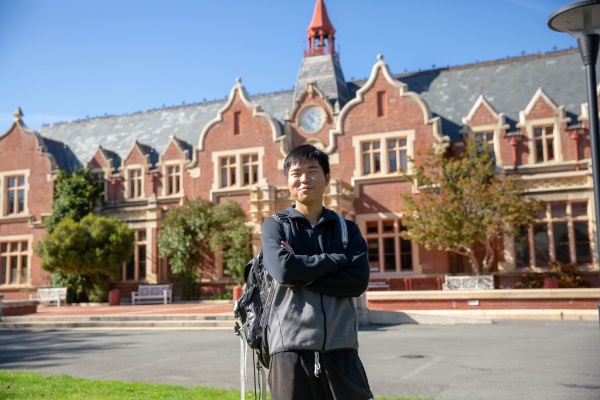
Quan Zhou is studying for an agricultural science degree
Stella Liu followed her passion as an early childhood teacher in Christchurch, while Quan Zhou is in his second year studying towards a Bachelor of Agricultural Science at Lincoln University. He is looking forward to starting his career and with Canterbury’s strong agritech sector, Quan is confident this will lead to a wide range of career options.
The project also launched an initiative to further strengthen relationships between tertiary providers Ara Institute of Canterbury, Lincoln University, and the University of Canterbury. Each hosted a familiarisation event for international school staff and included an opportunity to meet with alumni and current students. The well-attended events received positive feedback and were a valuable experience for schools as well as the tertiary providers.
Stefi Porter, International Education Partnership Manager at ChristchurchNZ, says the project has opened doors to new conversations and collaboration between Christchurch Educated providers.
“This project has been a great opportunity to work together as a region to build back up after the challenges of the last two years.”
The project complements the strong Christchurch Educated community and will support the sector to build back collaboratively and more sustainably.
-
From the CE: Steady progress continues
Since New Zealand’s borders reopened at the end of July I am pleased to note that we are making steady progress, although this can’t yet be fully quantified. The number of students with valid student visas who are in New Zealand is heading in the right direction, reaching 16,515 as at 16 October 2022. It’s important to note that these statistics are only part of the story. Students who travel to New Zealand for short courses of study from visa waiver countries or on working holiday visas aren’t included. It will be some time before reliable statistics are available on the total number of international students enrolled with New Zealand education providers this year. Anecdotally, though, we are hearing from schools, and from English language providers and others across the sector, that they are seeing gradually increasing numbers of international students enrolling or applying to them, which is good news.
Study Abroad Month has just drawn to a close in the United States and attracted a high level of interest and positive feedback, including some commitments for study abroad enrolments at New Zealand universities from the start of 2023. In the US we also recently signed our first ever education cooperation arrangement to be written in both te reo Māori and English, with the Louis Stokes Alliance for Minority Participation. You can read more about these and our other recent activities around the world in this issue of E-News.
In the Asia region, we are heading into our busiest season of international education events during October and November:
- Seoul: Study Abroad Fair 2022 COEX, the largest event of its kind in South Korea, including an agent seminar and a Kiwi Alumni event, on 20-23 October
- Tokyo: Japan partner reconnecting series on 25-26 October
- Hanoi and Ho Chi Minh City: Agent seminars and New Zealand Fair on 28-31 October
- Bangkok: Agent seminar and New Zealand Fair on 4-5 November
- Beijing: China Education Expo, the leading international education event in China, on 11-12 November.
Education Minister Chris Hipkins, accompanied by a small education delegation from New Zealand, was in Seoul promoting New Zealand as an international education destination in time to attend the study abroad fair and associated events, before continuing on to Indonesia and is now in Singapore – we will cover these activities in a future issue of E-News.
As we work to raise interest in studying with New Zealand and ensure positive experiences for international students, ENZ is working closely with other NZ Inc agencies. In this month’s E-News, we are pleased to publish the first in a series of regular updates from Immigration New Zealand, to provide timely access to the latest infomation on changes and trends.
Our partnership with the Ministry of Foreign Affairs and Trade (MFAT), that will see ENZ take over operational management of the Manaaki New Zealand Scholarship Programme, comes into effect on 1 November 2022. A transition team is in place, which will include several key staff members coming across to ENZ from MFAT, to support a successful handover for this important scholarship programme.
Whangaia ka tupu ka puāwai – that which is nurtured will blossom and grow.
Kia ora
Grant McPherson
-
Around the world in five
Brazil
Opinion of Brazilians on education and quality of life of New Zealand is the subject of research
China
China’s Covid rules and unemployment driving postgrad study abroad
Chinese school-leavers look closer to home for overseas study
Colombia
I AM NEW: Education New Zealand Working on Projects For International Education In Colombia
Indonesia
Thailand
Study abroad! Thais' interest in studying New Zealand has increased by more than 25%
Viet Nam
Education – an important cooperation area between Vietnam, New Zealand
International
Optimism trumps ethics in student recruitment ‘comeback’
The evolving role of technology in the international education sector
ICEF Podcast: Digital transformation in international education
FutureLearn acquired by Global University Systems
New Zealand
High-level Vietnamese political and education delegation welcomed to Waikato
-
Welcoming students and tourists to New Zealand as China re-opens borders
The successful local engagement – which was held both in person and via live stream – had nearly 60 school principals and educators attending in person and attracted more than 21,000 views (you can watch the presentation in Chinese language here).
The study tour forum was a part of the 2022 Redefine Asian International Schools and Education Conference (RAISE) in Guangzhou (postponed from December 2022 due to COVID outbreak). The RAISE Conference attracted 500 senior school leaders and teachers from more than 200 bilingual and international schools to discuss together the future of the international education in China.
The forum saw ENZ’s Senior Market Development Manager – Greater China, Felix Ye present an overview of New Zealand education for attendees. While Tourism New Zealand’s Strategic Relationship Manager, Alfred Li, and South China Trade Manager, Sandy He, shared an update focused on tourism in New Zealand.
Three Auckland-based operators from the education and tourism industry participated virtually and shared their knowledge. Gordon Chang, Founder, Southern Cross Ecotourism & Education Ltd spoke about the New Zealand ecotourism experience they offer their students. Fan Zhou, Director of Go New Zealand International Ltd spoke about how their study tour and short-term study programmes that are designed and developed for New Zealand schools, deliver both fun and education. Lisa Li, General Manager of China Travel Service (NZ) Ltd talked about their offering with over 20 years of award-winning tour services to Chinese customers.
ENZ’s Regional Director Greater China, Michael Zhang said marking the first day of China’s borders re-opening with a forum to promote Aotearoa as a study and travel destination was both timely and symbolic.
“The removal of quarantine for international arrivals in China has been eagerly anticipated by the education and tourism sectors. This was another example of excellent NZ Inc collaboration – thanks again to the Tourism New Zealand team!
“We can now build on the work that NZ Inc and New Zealand providers have done while travel was restricted and step up our engagement with local partners in 2023. Chinese students and travellers are keen to get back out into the world, and we look forward to seeing New Zealand providers back in-market soon”.
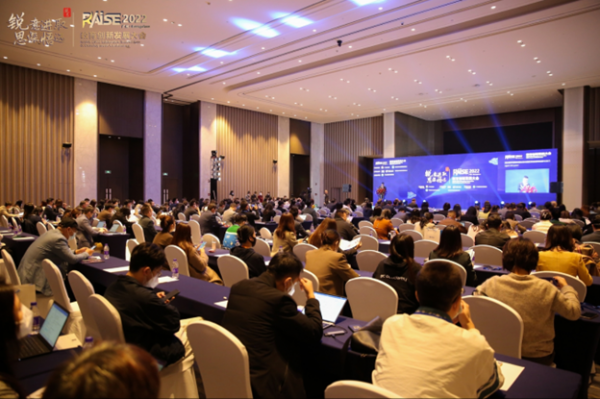
Redefine Asian International Schools and Education Conference, Guangzhou
-
ENZ re-connecting at ICEF ANZA Conference Perth 2023
More than 230 international student recruitment agents and over 150 providers from around 50 countries attended the first in-person ANZA conference since the Covid-19 pandemic. The conference was held from 12 to 14 April.
Education New Zealand Manapou ki te Ao (ENZ) is one of ANZA’s key supporters. It is an excellent opportunity for education providers and agents to connect, exchange and explore ideas that will grow the international education sector around the world.
ENZ’s Manager, Global Events and Agents, Janine Huxford, alongside Immigration New Zealand’s Manager of International Education, Celia Coombes, were invited to deliver a presentation on New Zealand’s road to recovery as a top study destination.
Janine said “Celia and I took this opportunity to begin our presentation by showcasing the unique cultural experience that international students have when they come to Aotearoa New Zealand. Our presentation began in a pitch-black room with the sound of the pūtātara, conch shell or sea trumpet ringing out.
“This was followed by a karakia acknowledging the Māori creation story that begins with a description of darkness and nothingness and continues to move between different states until light flows into the world that establishes a fundamental relationship between humans and the natural world. It was quite a spine-tingling experience, and no one will forget our introduction in a hurry,” she added.
Janine and Celia then went on to talk about the incredible mahi that our sector is doing across our various agencies and institutions to rebuild the international education market within Aotearoa New Zealand. “We shared with our audience that students considering international education are always going to choose the country first. For a niche market like Aotearoa New Zealand, it is important that our messaging is focused on what students will experience when they come to study with you”, said Janine.
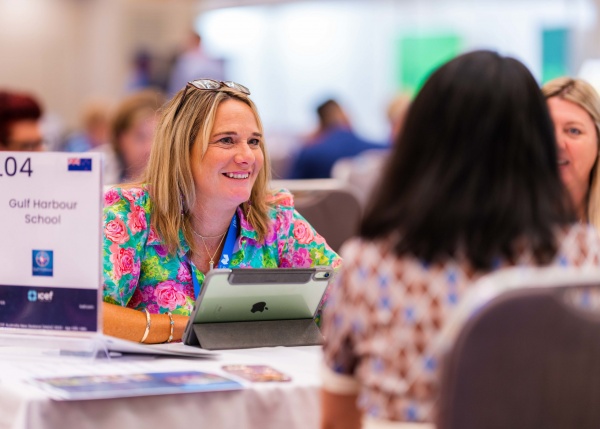
Representative from Gulf Harbour School on the Whangaparaoa peninsula meeting with an education agent at ICEF ANZA 2023 in Perth, Western Australia.
Janine’s comments were also included in ICEF’s podcast that was awarded to ENZ and broadcast during the April 2023 event. The podcast was entitled ‘Study destination promotion: the vital role of education agencies – Sponsored by ENZ’. The podcast can be listened to here.
The event was hosted in Perth, Western Australia and is part of a series of global ICEF events that provide excellent opportunities for the sector to come together and network with like-minded professionals.
Click here for the exciting announcement regarding the naming of the host city for ICEF ANZA 2024!
-
Survey shows that New Zealand is among top destinations for Brazilians who study abroad
Belta’s annual survey, sponsored by Education New Zealand Manapou ki te Ao (ENZ), was conducted between December 2022 and April 2023 with 763 students and 317 international education agents from all regions of Brazil surveyed to assess their perceptions of international education. The survey results were shared at a recent event in Sao Paolo with dozens of agents and media attending, in person and virtually, to hear about the survey’s latest findings.
ENZ’s Market Development Manager in Brazil, Bruna de Natale, delivered a short speech ahead of the results release. She said it was positive to see so much interest in the release of the survey results, especially when the results revealed that New Zealand continues to rank strongly as an international education destination amongst Brazilian students.
“In this most recent survey, New Zealand moved to seventh position on the list of top education destinations sought by Brazilians who studied abroad, compared to before the Covid-19 pandemic when it was in eighth place. The main reason driving country choice for the students surveyed is the quality of life – New Zealand ranks very well for the quality of life, education, and the protection of civil rights.
“The quality of teaching is another reason given by those surveyed when choosing New Zealand and 60% of participants rated the quality of our English schools and language programmes as good or excellent. It is fantastic to see that New Zealand continues to attract attention as a quality international education destination and it is certainly on the radar as a desired destination for future exchange students,” said Bruna.
Of the international education agents who were surveyed, 52.9% reported that the demand for students interested in New Zealand has remained stable since the borders reopened, while 20.6% recorded growth in interest. This group projects that the numbers of Brazilian students travelling to New Zealand will return to pre-pandemic levels in 2023 and 2024, with the highest flows expected for the first (35.3%) and second quarters of 2024 (32.4%), with demand increasing gradually from the first quarter of 2023.
For a copy of the full survey in English, please email belta@belta.org.br.
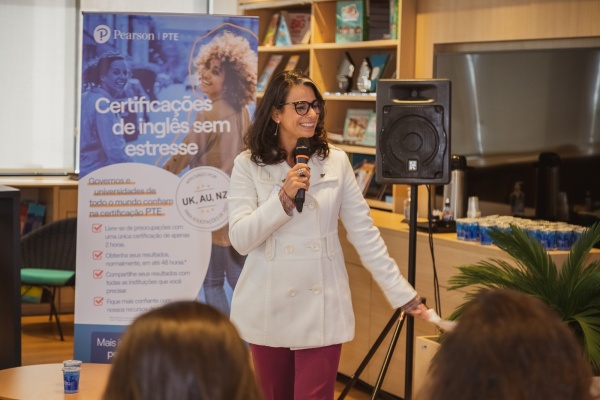
Bruna delivering an introductory speech at an event which released the results from Belta’s survey on international education.
-
New Zealand education in focus during Prime Minister’s trip to China
Education elements featured strongly in the Prime Minister’s Trade Delegation to China helping raise the visibility of New Zealand as an education destination for Chinese students.
To launch the trip, the delegation joined the Prime Minister at a Showcasing New Zealand event held at the New Zealand Embassy in Beijing to promote New Zealand as a travel and study destination. ENZ invited key media, influencers, and Chinese and New Zealand students to interact with the Prime Minister. This sparked significant local news coverage, amongst leading Chinese state media, setting the tone for the visit and highlighting the significance of international student exchanges between New Zealand and China. New Chinese media outlets also were seen covering New Zealand education as a topic for the first time.
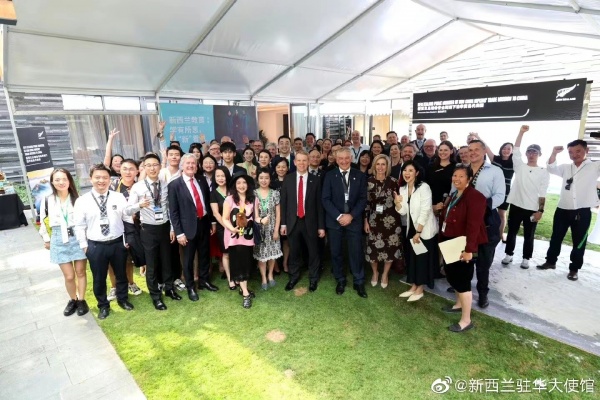
Group photo at Showcasing New Zealand event! (It was a kiwi bbq)
The Prime Minister also gave an address at Peking University to students, media, and the New Zealand delegation. To read the full speech, please visit the Beehive website.
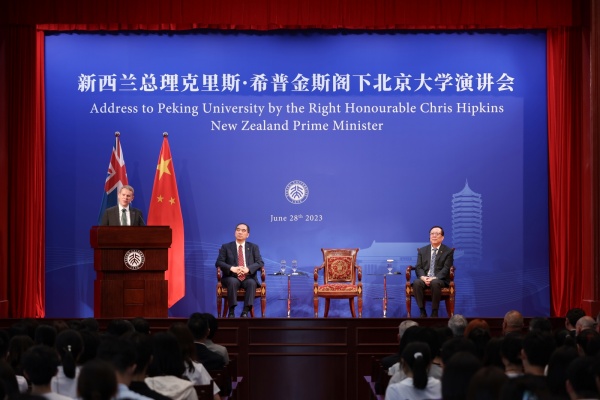
Peking University is host to the New Zealand Centre. Established in 2007 as a collaborative project between Peking University and the University of Auckland, the New Zealand Centre at Peking University has grown to represent all eight of New Zealand’s universities and enable high-level engagement across a range of departments and faculties. During the visit to the University on 28 June, the Prime Minister, with Hao Ping, Chair of Peking University Council and Gong Qihuang, President of Peking University, the Ambassadors of New Zealand and China, and representatives of the New Zealand Centre launched the Rewi Alley Professorship.
There were also other several significant developments in our bilateral education links with China that were achieved while there. These included:
- Signing of the Arrangement on Mutual Recognition of Academic Qualifications in Higher Education between the Ministries of Education witnessed by Prime Minister Rt Hon Chris Hipkins and Premier Li.
- Signing of a Strategic Partnership between Education New Zealand and Air New Zealand to support international education mobility and joint promotion in China. To read more, please visit the article on ENZ Collaboration with NZ Inc Agencies in China.
- The education delegation meeting with the Vice-Minister of Education Chen Jie (responsible for international cooperation) and China Ministry of Education officials. The meeting underscored the importance of a strong government-to-government relationship and provided a chance to showcase the education sectors present within the New Zealand delegation and discuss areas of existing and potential cooperation.
- A Sustainability Roundtable with a focus on education involving the education sector delegation and Chinese education partners.
It was a busy, challenging, insightful and ultimately very rewarding week. The education delegates also shared their own feedback. John van der Zwan, Executive Director Schools International Education Business Association reflected that the mission to China was hugely valuable and a chance to get high level insights into working with Chinese officials and agents following the pandemic.
“The mission was also a special opportunity to engage with the Prime Minister and other government officials on the role and importance of international education for our school sector,” he said.
Executive Director of English New Zealand, Kim Renner, noticed the shift in how New Zealand is profiled in China compared to many years ago and echoed the response from other delegates that the visit was valuable for the representatives of the education sectors.
“China is a development market for most of our members, so it was a great opportunity for English language to be part of this important delegation, particularly the meetings with the Vice Minister of Education and JJL Overseas Education Agency.”
“While seeing the country is a key part of study travel, we know that inbound students also want an immersive experience focused on people, cultural exchange and making connections. This was certainly showcased during the visit and was received very positively by all those we engaged with”, added.
ENZ would like to offer its sincere thanks and congratulation to everyone who was involved in the preparation and planning for the visit and gives special recognition to the education sector representatives on the Prime Minister Trade Delegation.
- Signing of the Arrangement on Mutual Recognition of Academic Qualifications in Higher Education between the Ministries of Education witnessed by Prime Minister Rt Hon Chris Hipkins and Premier Li.

